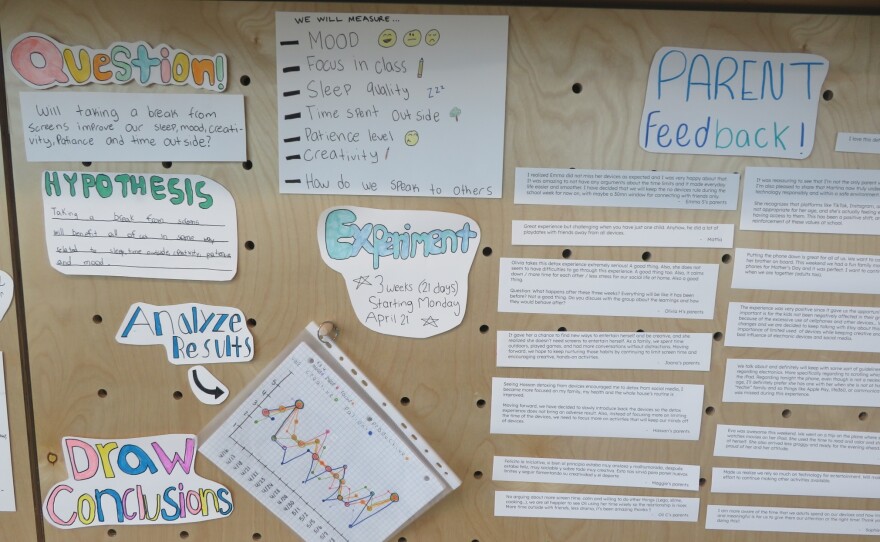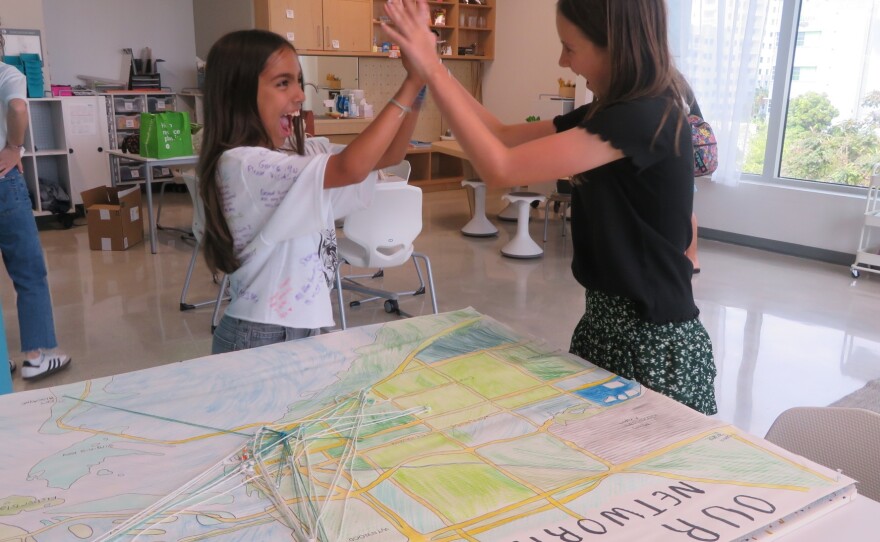To those part of the latest generation, the thought of having only a few TV channels to flip through feels almost dystopian.
After school, the average routine for most kids today is to dive straight into the digital maze, hopping from YouTube to Instagram to Snapchat, spending an average of six hours a day ingesting endless content on demand.
You’re not considered in the loop, if you’re not part of it. That’s how the kids see it. Most wouldn’t dream of giving up their phones.
But the kids at KLA Academy did.
A group of 19 fifth-graders at the private elementary school in Brickell embarked on an interdisciplinary experiment in April.
The challenge was simple: a 21-day digital detox. No phone, tablets, or video games— only a couple hours of TV a day and unplug one hour before bed.
Inspiration behind the detox
When Amy Crehore’s fifth-grade class started exploring the evolution of communication, the students quickly latched on to one question during their weekly class discussions: What is all this screen time doing to us?
Crehore, 33, has been teaching at KLA for four years. The curriculum at the school is inspired by the Reggio Emilia approach, which encourages students to lead their own learning through curiosity and exploration.
“ So as teachers, we're more facilitators of learning,” said Crehore. “We pay really close attention to what the students are interested in, what they're doing.”
What Crehore noticed this school year was that her students were spending a lot of time on their devices— not just at home, but even in each other's company.
The class began learning how communication devices work, how they’ve evolved throughout history, and how they impact our social and emotional wellbeing.
The students were divided into two expert groups. The first, the engineers, focused on how digital platforms and communication devices work. The second, the social scientists, studied how those same devices impact social behaviors and mental health.
It was the social scientists that pushed for the class to participate in the detox.
Their research for the project took them across the world. First, to a boarding school in Australia that banned smartphones, then to a school in the U.K. featured in the documentary Swiped: Hooked on Phones, where students attempted a similar detox, and finally to the work of social psychologist Jonathan Haidt, whose book The Anxious Generation argues that constant device use is fundamentally reshaping childhood.
The experiment from the Swiped documentary quickly gained momentum in the classroom and the students wanted to try something similar.
“A few of them were really interested in it and kind of encouraged their classmates to join,” Crehore said. “We thought we would have a control group and an experimental group, but we ended up having all of them try it.”
Two students emerged as natural leaders in that push: Eva O’Brien and Alana Contesse Quintero. Both encouraged their peers to take on the challenge.

“We told them, you know, you can quit at any time, but we encourage you to try it and just to see the effect,” Crehore said. The 14 girls and five boys who participated in the experiment did so voluntarily.
The students helped create their own guidelines for the experiment. They presented the rules to their parents in a class meeting over Zoom.
“We wanted to measure different aspects like sleep, focus, social connections,” said Crehore. “And it was really important that it wasn’t a punishment. They could opt out at any time.”
Along the mental clarity students began to report almost immediately, the project also aimed to teach them how our brains work on devices—covering topics like the prefrontal cortex, impulse control, and dopamine loops.
Crehore emphasized the purpose of the project wasn’t about demonizing phones. It was about understanding what makes them so hard to put down.
'Digital Detox Diaries’
Throughout the experiment, the students documented their progress through daily vlogs using their school-issued Chromebooks and gave them a name: The Digital Detox Diaries.
On the first day of the detox, Eva recorded herself saying what most of the children had been thinking: “Our class, fifth grade, is doing a social experiment which is not to use our phones for three weeks and I know what you're saying, OMG I can’t survive.”
Over the next three weeks, the diaries captured moments of frustration, discovery, and surprising joys as the students chronicled their experiences in real time.
Some missed their devices almost immediately.
On day four, Elena Velasquez shared how the detox was starting to make her feel. “Patience? I don’t have patience for anybody,” Elena said.
Other students like Maggie Castillo, noticed an almost immediate improvement in their mood.
“Before I would get mad and destroy everything around me,” Maggie said. “But this time, I know how to control myself and how to stop, so I feel like this detox is really helping me.”
By day nine, the struggle persisted for others like Elena. “The struggle is real, you guys,” she said. “It’s there. I miss my iPad every single five seconds.”
As the days passed, new habits emerged for some students. By day 15, Maggie found she suddenly had more time and reached for something she hadn’t in a while— a book.
“I started a book— a book from my house,” Maggie said. “I would have never done that if I had my iPad. Like I started a book? That is so weird for me to start a random book on a random day.”
Maggie also told her mom she wanted to make some permanent changes.
“I literally told my mom, next time I have a playdate, when the digital detox is over, don’t let me have my iPad on playdates,” Maggie said.
Eva’s vlog on day 15 captured her own shift: “It’s amazing how three weeks can change your whole life,” Eva said.
By day 17, Elena noticed even her small routines began to change.
“One thing that I’ve been noticing from my productivity is that I’ve been making my bed, which is not usual for me,” Elena said.
All the students reported stronger social connections. Alana shared that a recent playdate she had, well, felt different.
“I also recently had a playdate with Vale, me and Vale always just do dances and stuff,” Alana said. “We just went outside and talked for like four hours, and it was so refreshing.”
When it came to her relationships back home, Alana said, “Me and my mom have definitely connected more, we’ve watched more movies together, I feel like we’re more connected.”
For Olivia Caron Serrano, the change stuck. “I honestly kind of like my life without any devices. I’m going to delete Pinterest and Netflix,” she said.
“I’m a kid and I’m supposed to be having interactions with my family and my dad told me he felt more connected to me.”
Alana proclaimed a similar resolution towards the tail end of the digital detox, saying, “I want to only use my device for thirty minutes to an hour each day,” she said. “I hope I can accomplish this because I don’t want to go back to my screen and be addicted again, I did this for three weeks or 21-days for nothing? Like no.”
Lasting reflections
After the digital detox concluded, Eva and Alana, the student leaders that helped inspire their peers to purse the detox, shared some of the lessons that stayed with them.
“ I think I would do it again and since I'm going into middle school, I'm going to use my device a lot more,” Eva said. “So I think that I should just always look back at it.”
She paused for a moment. “I should remember this moment in time because devices and technology are just gonna keep growing.”
For Alana, the shift was personal and profound. She said she felt happier, slept better, and even performed better in school.
“ I hung out with my friends so much more, and I feel like when I was on my screen— like Miss Amy was saying— the dopamine loop,” Alana said.
“I feel like I was so much sadder on my screen and without my screen, I got so much better sleep. And I was so involved with my friends and I felt like we were more connected.”
She said learning about the brain science behind screen use helped her take control.
“Before I even started learning about this stuff, I would really not care if I was scrolling the whole day,” Alana said. “And then I learned about oxytocin, then I learned about dopamine and what phones can do to you. And so then I was like, why am I doing this?”
That awareness, she says, changed everything, which echoed Crehore’s fundamental mission with the project: That knowledge is power.
Even Alana's relationship with her brother, who she described as “addicted” to his phone, shifted. “We would like to watch movies together and I felt like we were way more connected,” she said. “I love to see my brother like that.”
They weren’t the only ones that noticed changes.
“We noticed that they were more socially connected to one another and to us as their teachers,” Crehore said. “For instance, one student who would come in the morning and barely say hello to us, started to hug us every morning.”
Parents felt the ripple effect back home.
Gus O’Brien, Eva’s father, said the experiment ended up becoming a family project.
“It gave our kids good permission to call us out if we were stopping halfway through a conversation and texting,” he said. “Or both of us sitting there working on something and the kids are like, we’re here,” he said.
He said the experiment made both the children and parents “a bit more patient, a bit calmer, generally.”
If the detox didn’t fundamentally change the students’ relationships with technology, it gave them a way to think about it—language to describe what it does to their minds, and the awareness to notice when it’s too much.
“I don’t want to go back to my screen and be addicted again,” Alana said near the end of the detox. “I did this for three weeks or 21 days for nothing? Like no.”
For some, it wasn’t just about giving up a device. It was about paying closer attention — to their moods, their routines, and each other.
“It’s amazing how three weeks can change your whole life,” Eva said.









